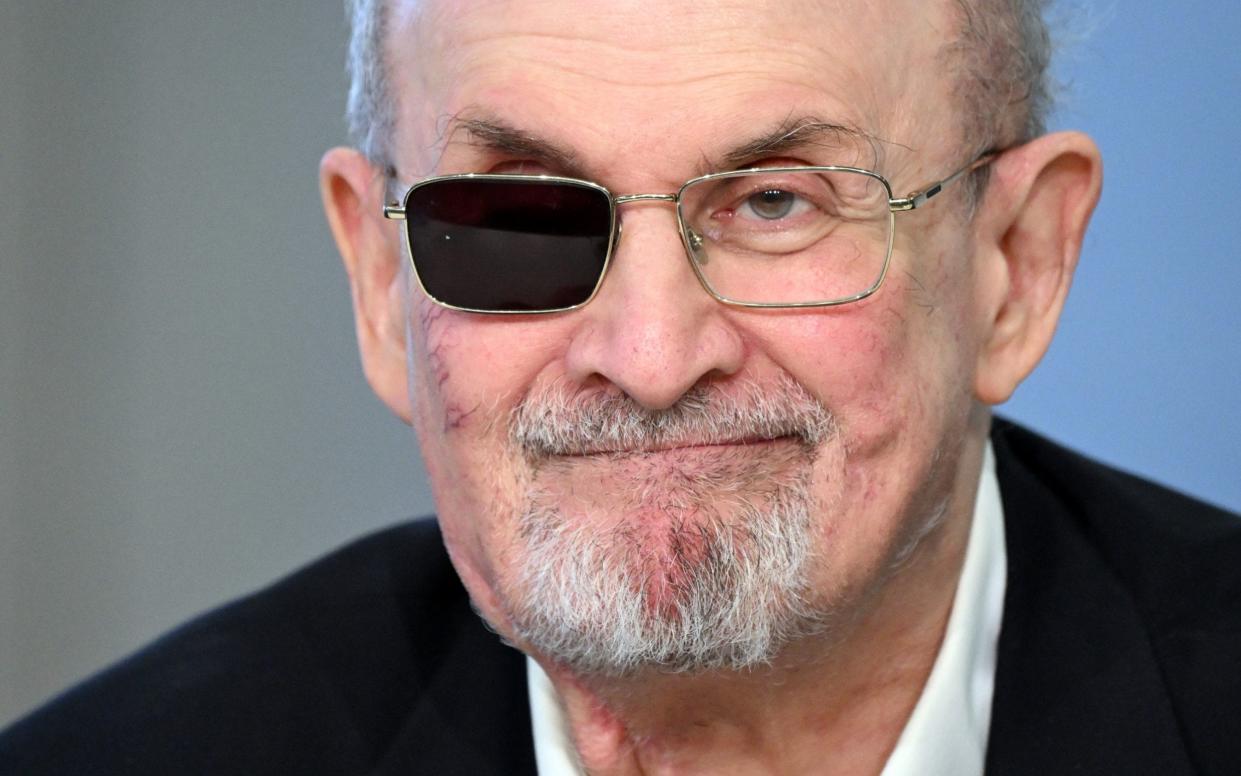Seven things we learned from Sir Salman Rushdie’s memoir

Sir Salman fears going blind
In his memoir, Knife, the author says his greatest fear is blindness. Having lost one eye in the attack on him in August 2022, he fears losing sight in the other.
He has macular degeneration – a condition of the retina that can lead to loss of vision – in his left eye, and has been receiving treatment for several years.
Sir Salman has to have injections into the eye once a month. He says his condition is currently stable, but that if he loses his sight altogether he will be left in his personal version of Room 101, the torture chamber in George Orwell’s Nineteen Eighty-Four in which people are subjected to the thing they fear most.
He saw attacker coming, but did not run
Sir Salman says he saw the masked knifeman coming towards him at the Chautauqua Institution in New York State and stood up, “transfixed” as he watched him approach “hard and low”.
For reasons he cannot explain, he made no attempt to run away or fight him off, saying: “I just stood there like a pinata and let him smash me”.
His reflection on what happened is that, when an attack comes out of the blue, “fear, panic, paralysis take over from rational thought” and that in the presence of violence “our minds no longer know how to work”.
Wife was told he would not make it
Sir Salman’s wife, Eliza, was a seven-hour drive away in New York City at the time of the attack, and was told on the phone that her husband was “not going to make it”.
Doctors who assessed him when he was brought into in hospital by air ambulance later admitted that they did not think they could save him.
Eliza managed to charter a private aircraft at a cost of more than $20,000 to get to the hospital in Erie, Pennsylvania where surgeons spent eight hours working on different parts of Sir Salman’s body simultaneously to save his life.
He was stabbed 15 times
For the first time, Sir Salman reveals the full extent of the injuries he suffered when he was stabbed 15 times in an attack that lasted 27 seconds.
He was stabbed in the neck, right eye, left hand, liver, abdomen, face, forehead, cheeks, mouth and chest.
Part of his small intestine had to be removed, he was blinded in his right eye, and if the blade had penetrated a matter of millimetres further it would have entered his brain.
After two years of physiotherapy, his left hand, which was badly damaged, is functional again, although he still has no feeling in the middle two fingers. He also had to have stitches in his tongue, which he bit as he fell to the ground.
He had a premonition of the attack
Two days before the attack, Sir Salman had a nightmare about being in a gladiatorial arena where a man was stabbing down at him with a spear as he lay on the ground.
He was thrashing around in bed and was so shaken that he told his wife he wanted to cancel the lecture he was due to deliver.
In the end he decided he was being irrational, and he also needed the speaking fee to pay for the air conditioning in his apartment to be replaced.
He is aware of six other assassination plots
In the years following the fatwa being placed on him by Iran’s Ayatollah Khomeni in 1989, which put a $3 million bounty on his head, Sir Salman was informed of six assassination plots.
In August 1989, a would-be assassin using the alias Mustafa Mahmoud Mazeh blew himself up by accident in a London hotel. Mazeh was priming a bomb concealed inside a book in his room at the Beverley House Hotel in Paddington, which destroyed two floors of the building.
A Lebanese group later said he died preparing an attack “on the apostate Rushdie” and a memorial to him in Tehran describes him as “the first martyr to die on a mission to kill Salman Rushdie”.
He has round-the-clock protection in UK
Sir Salman makes his own arrangements for security when he is at home in New York, but when he visits the UK to see his family he is given 24-hour protection by the Metropolitan Police.
The Met provided him with bodyguards for years as he moved more than 50 times between secret addresses in the years after a bounty was put on his head. After the 2022 attack, he got back in touch with his old Met contact.
He says that when he arrived in London for his first visit since the stabbing, the Met was there to meet him at the airport and stayed with him at all times.


